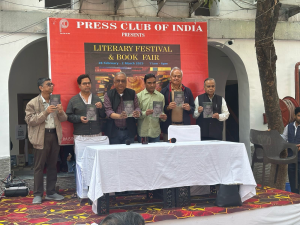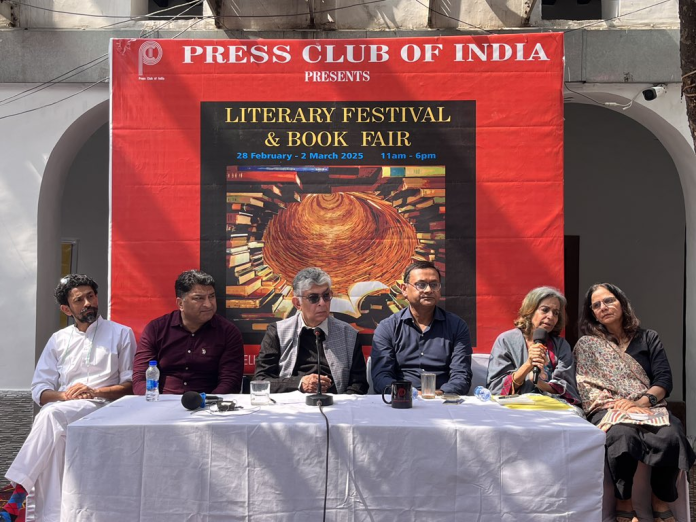Press freedom, challenges journalists face, the power of literature in shaping public discourse, media and the law, and financial instability plaguing journalists formed the core of discussions at the Press Club of India’s (PCI) first-ever three-day literary festival and book fair, held from February 28 to March 2 at the club premises in Delhi’s Raisina Road.
The event drew more than 80 publishers, booksellers, and literary enthusiasts – creating a dynamic platform for exploring the intersection of journalism and literature, featuring engaging discussions, book launches, and interactive workshops, PCI announced in a post-event statement.
“This inaugural event exceeded all expectations. The conversations reaffirmed the deep connection between journalism and literature,” Gautam Lahiri, president of PCI, said. “We’re already planning for next year’s festival with more energy and enthusiasm.”
According to the organizers, books worth Rs 10 lakh were sold. There were 12 book launches from authors such as Jai Singh, Rohini Singh, and Masoom Muradabadi.
“We were thrilled with the turnout and the energy throughout the festival,” Neeraj Thakur, secretary-general of PCI, said. “What started as a celebration of journalism’s literary legacy has now become a major cultural event, and we’re committed to making it bigger and more inclusive in the future.”
Press freedom
A key highlight was a panel discussion on protecting press freedom and the challenges journalists face. The discussions were direct, informative, and at times, concerning, as speakers shared real-life experiences and proposed solutions to protect journalism in India.
The session titled ‘How Media Bodies Can Protect Press Freedom,’ featured Abhinandan Sekri from Digupub, Sujata Madhok of the Delhi Union of Journalists, Anant Nath, president of the Editors Guild of India, Binny Yadav from Indian Women’s Press Corps and Neeraj Kumar of Press Club, The session moderated by journalist Vinay Kumar debated the role of media organizations in defending press freedom beyond just issuing statements.
Anant Nath defended the importance of public statements, arguing they serve as essential signals of resistance. He cited the Editors Guild’s role in comedian Kunal Kamra’s legal battle against the IT Rules, 2023, which led to a favorable ruling from the Bombay High Court.
“The government is doing what is well within its control. It is throwing money into a news system that has, on its own, become incredibly financially insecure…I know enough and more owners who would love to move away from government spending, but unfortunately, it’s not possible. It’s too much. Government spending on media is increasing … For an independent organization to stand up against the government can be difficult, which is why these organizations are important. Under these bodies, we can take collective action which we can’t individually,” Nath said.
Good journalism, Nath said, can only be done on the back of good business. Otherwise, you will be dependent on someone’s goodwill. “That could be donors or grants. Ultimately, readers pay, and that’s the best way to run an independent media organization.”
“As the Guild, when we approached the INS to support an EGI initiative, we were told that EGI is run by ‘leftist liberals.’ At the same time, in the Guild, we say INS is in the hands of the government. But we are all in this together. We have to find a way to work together and be open-minded,” Nath said.
Abhinandan Sekri called for a professionally managed secretariat to protect journalists’ rights, pointing out that reporters, already occupied with their work, cannot take on advocacy efforts alone. Digipub, an organization of digital media organizations, he said, is working to build such a support system for independent journalists and digital news platforms.
Sujata Madhok highlighted the financial instability plaguing journalists, using the sale of United News of India (UNI) to The Statesman for Rs 44 crore as an example. She asked if this amount would be enough to clear pending salaries and provident fund dues, emphasizing that economic insecurity is a major threat to press freedom.
Neeraj Kumar warned that journalists are increasingly abandoned by their organizations when they challenge powerful figures. He shared an incident where a reporter was disowned after questioning a minister, underscoring the urgent need for a press body that offers legal, financial, and professional assistance.

“Today, the entire responsibility of journalism has fallen on the shoulders of independent journalists. Media owners either want to go to the Rajya Sabha or run their empire…When our own organizations don’t support us, then who will? This is why we need a press body that will help journalists, professionally, legally, and financially… Because if you’re not in favor of the government, then you’ll be persecuted. And the cases will not be filed where you live, it’ll be elsewhere. And you will have to go there and fight…It’s important to stand with journalists who are persecuted otherwise journalism will not survive,” Neeraj Kumar said.
The discussion touched on how government funding compromises media independence. While many media owners want to reduce reliance on state advertising, Nath noted that its sheer scale makes it difficult. He stressed that only collective action from media bodies can push back against financial pressures that threaten editorial freedom.
Media and the law
A session on Media and the Law featured legal experts Warisha Farasat, Sarim Naved, Pamela Philipose, and Vivek Mukherjee, moderated by journalist Mahtab Alam. The panelists discussed how existing laws are increasingly being used against journalists, particularly in sensitive regions like Kashmir.
Farasat highlighted how the Unlawful Activities (Prevention) Act (UAPA), originally meant to tackle terrorism, is now being used to silence journalists. Philipose warned that digital media, once seen as a space for free speech, is now under increasing legal scrutiny. Sarim Naved pointed out the legal ambiguity surrounding independent digital reporters, who often lack formal recognition as journalists, making them more vulnerable.
Philipose urged both journalists and the public to stay vigilant against laws that restrict press freedom. She warned that expanding legal and financial controls could soon choke independent journalism, with even ordinary citizens being empowered to accuse reporters of “anti-national” speech.
In a session on challenges before a free press, Hartosh Singh Bal of The Caravan spoke about how the control of media is concentrated among a group of castes and how journalists must muster courage within themselves. He spoke about how reliable, critical reportage of Kashmir has disappeared from our press today.
Journalist turned author Urmilesh, who was executive director of Rajya Sabha TV, mentioned that he met four editors after the Mandal Commission report came out, who had not read its contents but were writing editorials about it.
Sarim Naved discussed how the definition of a journalist has expanded but is not reflected in the law. He said even though a reporter on YouTube is a journalist, the law may not recognize them as one. At this point, he says, much work needs to be done to engage with the law and the courts to ensure protection for all journalists.
A session on Covering India’s Foreign Policy had KV Prasad, Kallol Bhattacharjee, Nayanima Basu, in conversation with Smita Sharma. Basu explained that social-media narratives on policy are often misleading – how ‘normalcy’ in Kashmir was not real and how voters admitted this during the recent elections. Prasad reinforced the importance of verifying information seen on social media, before reporters use it in their pieces.
In the Author Spotlight segment, Rehan Abbas launched his book Tapish in a discussion with lyricist Alok Shrivastav and journalist Sudha Sadanand. Independent journalist Makepeace Sitlhou, a contributor to But I Am One of You, spoke with rights activist Suhas Chakma, emphasizing the importance of better media coverage of the Northeast.
In her vote of thanks, Sangeeta Barooah Pisharoty, vice president of PCI, expressed gratitude to all contributors, including publishers, booksellers, and participants, while emphasizing PCI’s commitment to improving and expanding the festival in future editions.
(The article is based on PCI’s press release and a series of tweets on its X handle)

















